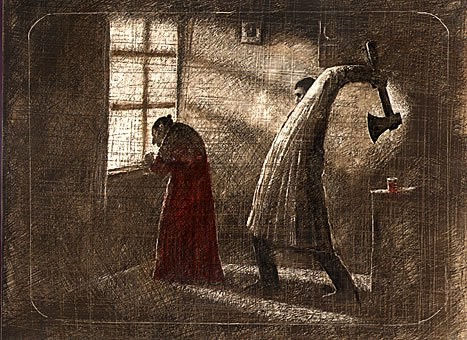3 Existentialist Works That You May or May Not Like to Read
- Meru Badyal
- Feb 20, 2022
- 4 min read
Updated: Sep 3, 2022
Is the corona pandemic as ‘absurd’ as it can get for humans?
Or has the mad chaos of ‘social media’ already dug our early ‘existentialist’ graves?
As students of English literature, there were quite a few “isms” we had to learn/cram to pass the examinations: Feminism, Existentialism, Absurdism, Marxism, Capitalism, Romanticism, God-only-knows-how-many-more-isms.
Our 20 years old-young brains were required to remember, dissect, and inter-relate 100s of such “isms” and identify them all in literary texts- novels, plays, and poems!
Of all the countless “isms”, existentialism is today more relevant than before!
Though, #metoo feminism enthusiasts will vociferously disagree! ;)
Let us take a look at 3 classic existentialist works that can help a new reader to explore or maybe get more confused about existentialism!
P.S. - Do not consider my explanations ‘absurd’ as absurdism is a central tenet of existentialism. ;)
Crime and Punishment (1866) by Fyodor Dostoevsky:

PC- Medium
The classic work takes you on Raskolnikov’s (the protagonist) intense guilt conscience journey after he commits a murder. A classic work of Russian literature, Crime and Punishment takes a few weeks/ even months to read. That is once you get past understanding and remembering long, unpronounceable & confusing Russian names! But once you’ve found the right flow, you just can’t keep it down, no matter how many feverish days it takes to finish!
I don’t necessarily feel comfortable/skilled enough to review a Russian magnum opus of Dostoevsky- the emotional depth of characters and their inner vulnerabilities lie stark naked for the reader to see, making the reader conscious of her/his own dark vulnerabilities & moral choices. Though written more than a century ago, it touches upon existentialist themes - moral choice/free will, guilt, remorse, and if one is lucky enough, the ultimate redemption!
The intense book on existentialism for sure isn’t for the faint-hearted!
Popular Quotes:
“To go wrong in one's own way is better than to go right in someone else's.”
“I used to analyze myself down to the last thread, used to compare myself with others, recalled all the smallest glances, smiles and words of those to whom I’d tried to be frank, interpreted everything in a bad light, laughed viciously at my attempts ‘to be like the rest’ –and suddenly, in the midst of my laughing, I’d give way to sadness, fall into ludicrous despondency and once again start the whole process all over again – in short, I went round and round like a squirrel on a wheel.”
Waiting for Godot (1952) By Samuel Beckett:

PC- Britannica
A much-loved and oft-quoted play in the academic circles, Waiting for Godot is a brilliant ‘tragicomedy’ which changed the course of 20th century drama.
The play belongs to the ‘Theater of Absurd’ genre and investigates post-war alienation in a grotesque comical manner. The brilliance of Beckett is that he wrote an innovative play without using conventional theatrical devices - no plot, character, dialogue in the traditional sense! It puts the reader/watcher in an uncomfortable scenario - where his own alienation takes a grip over his senses while watching the classic work of art.
The two leading characters, probably tramps, Estragon and Vladimir, are waiting for someone called “Godot” who never comes or maybe doesn't even exist.
In the act of ‘waiting’, they indulge in comic wordplay and mundane/repeatitive conversations on topics like suicide, Bible,Godot, and sometimes just meaningless babble. Use of language here is just to fill the emptiness of post-war modern life devoid of an essential meaning or faith/ God.
Godot might represent a person’s symbolic search for an essential meaning of his existence… A search which is unfulfilled to the very end, at least in an existential setting!
Popular Quotes:
“Estragon: We always find something, eh Didi, to give us the impression we exist?”
Vladimir: Yes, yes, we're magicians.”
“We wait. We are bored. (He throws up his hand.) No, don't protest, we are bored to death, there's no denying it. Good. A diversion comes along and what do we do? We let it go to waste. Come, let's get to work! (He advances towards the heap, stops in his stride.) In an instant all will vanish and we'll be alone more, in the midst of nothingness!”
The Trial (1925) by Franz Kafka:

PC- Archive
A fellow named Joseph K., and later on referred to as just K., is suddenly arrested. What follows next is a series of meaningless attempts by him to understand the nature of his crime, which is not told to him or the reader till the end.
The Trial is a riveting tale of a man’s alienated journey. A journey that he has to take against all odds - corrupt and inaccessible bureaucracy, broken family structure, and a seemingly incomprehensible and absurd world.
The modern - non linear narrative takes some time to comprehend, but it surely is a delight to go through the grotesque journey through the eyes of K. The novel is apparently an absurd parody of the legal system, police, and a utilitarian state.
The classic work brilliantly portrays the ‘Kafkaesque’ unreal world where a force is continuously working against a man. And the man finally gives up as he is too alone or too small an entity to fight with a seemingly unfair, indifferent and absurd world.
Popular Quotes:
“Someone must have slandered Josef K., for one morning, without having done anything truly wrong, he was arrested.”
“It would have been so pointless to kill himself that, even if he had wanted to, the pointlessness would have made him unable.”
“You must not pay too much attention to opinions. The written word is unalterable, and opinions are often only an expression of despair.”
Copyright © [Meru]. All rights reserved.




Comments